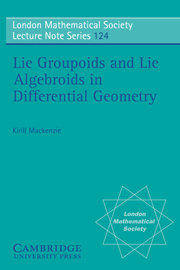Book contents
- Frontmatter
- Contents
- INTRODUCTION
- CHAPTER I The algebra of groupoids
- CHAPTER II Topological groupoids
- CHAPTER III Lie groupoids and Lie algebroids
- CHAPTER IV The cohomology of Lie algebroids
- CHAPTER V An obstruction to the Integrability of transitive Lie algebroids
- APPENDIX A On principal bundles and Atiyah sequences
- APPENDIX B On Lie groups and Lie algebras
- APPENDIX C On vector bundles
- REFERENCES
- INDEX
CHAPTER IV - The cohomology of Lie algebroids
Published online by Cambridge University Press: 03 May 2010
- Frontmatter
- Contents
- INTRODUCTION
- CHAPTER I The algebra of groupoids
- CHAPTER II Topological groupoids
- CHAPTER III Lie groupoids and Lie algebroids
- CHAPTER IV The cohomology of Lie algebroids
- CHAPTER V An obstruction to the Integrability of transitive Lie algebroids
- APPENDIX A On principal bundles and Atiyah sequences
- APPENDIX B On Lie groups and Lie algebras
- APPENDIX C On vector bundles
- REFERENCES
- INDEX
Summary
It is one of the principal these of this book that Lie algebroids deserve to be recognized as mathematical objects in their own right. It will already be apparent from III§5 that infinitesimal connection theory – that part of standard connection theory which does not depend on the concepts of path-lifting or holonomy – can be developed entirely within the context of transitive Lie algebroids, and the final step in demonstrating this is accomplished early in §1. The cohomology theory which is developed in this chapter includes the equivariant de Rham cohomology H*deRh(P)G of a principal bundle P(B,G) (with coefficients in vector bundles deRn associated to P(B,G) now allowed) and incidentally shows that this cohomology, which has been the subject of an enormous body of work (see Greub et al (1976)) is strictly an infinitesimal invariant: principal bundles which are locally isomorphic will have the same equivariant de Rham cohomology although they need not be isomorphic.
The advantages of this point of view, both for connection theory and cohomology theory, are immense. One should try to imagine a situation in which Lie group theory was actively pursued without any use being made of the Lie algebra. The situation for Lie groupoid and principal bundle theory is exactly comparable: it is for example well-known that curvature is a more accessible, but less subtle, invariant than holonomy; from the results of III§7 it is clear that two locally isomorphic bundles will admit the same infinitesimal connections and that corresponding connections will have the same curvature, but the holonomy of these connections will depend upon the connectivity properties of the underlying bundle.
Information
- Type
- Chapter
- Information
- Lie Groupoids and Lie Algebroids in Differential Geometry , pp. 185 - 258Publisher: Cambridge University PressPrint publication year: 1987
